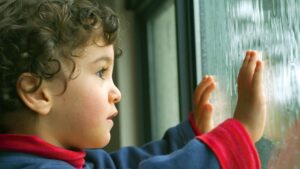The fear of being alone, even for a short time, may be due to the following reasons:
1. A child cannot be without a mother and https://argoprep.com/blog/culturally-responsive-teaching-what-you-should-know/ for a long time.
When a mother is outside the baby’s access zone, that is, he does not feel her presence, he feels anxiety. The physical breakup with mom does not provoke a conscious thought, but a deep emotional impulse. This is typical for children under 3-4 years old.
Separation from mother is perceived negatively at the level of instinct. Such emotional outbursts delay the maturation and development of children. And, of course, they cause discomfort to parents who are always forced to be in the field of view of the baby.
2. Unpreparedness for increased responsibility.
Leaving a child alone, parents want to instill independence and independence in them. But then they wonder why a 5-year-old child is afraid to be alone. The answer is simple: he is not ready for it.
Next to adults, he is comfortable and safe, and alone – dreary and scary. He understands that he needs to do something very difficult: literally, take care of himself and read https://argoprep.com/blog/goal-and-strategy-for-schools/. But he doesn’t know how to do it yet.
Psychologists recommend not to leave children under 7-8 years old alone.
3. Parting as a punishment.
If the parents practiced such a type of punishment as a time out (when the child is taken to another room so that he thinks about his behavior), then loneliness for him may be associated with punishment. Breaking this stable bond will not be easy, because for several years the time-out was an effective tool to calm the baby. And now the duration of the pause has increased, and even my mother is not just in the next room, but she is not at home at all.
4. Children perceive time periods differently.
Not at all like adults, because they feel the passage of time in a different way. What is only half an hour for an adult, is a temporary abyss for a child. In these few tens of minutes, an adult can only cook scrambled eggs, and a child will redo a bunch of things, get dirty, get tired and even fall asleep.
Remember how your baby reacted when you were the last to pick him up from kindergarten. Surely he whined displeasedly or even threw tantrums because of your 5-minute delay. Because each of these minutes was filled with dreary expectation and dragged on endlessly.
By the way, the constant delay of parents can cause reluctance to attend kindergarten.
5. Rejection of loneliness.
It’s not that loneliness causes fear. Rather, it is about the rejection of this state. A child may not be afraid at all to be without a mother. But it is unbearably difficult for him to be alone – boring, uninteresting.
But at what point does fear arise? Having survived several times the departure of his mother and https://argoprep.com/blog/building-professional-learning-communities/ from home, the child is afraid of repeating this dull pause. The expectation of imminent loneliness upsets and frightens him.
6. The child thinks he has been abandoned.
And they didn’t quit forever, but simply temporarily ignored. Staying at home alone, he feels himself not involved in the chores and affairs that adults are busy with. They have their own affairs, and the child has only a silent contemplation of the slammed door.
But after all, in most cases, a child can make an excellent company – both during a visit to the dentist and on a grocery trip. Therefore, if there is the slightest opportunity not to leave him alone at home, it is better to use it.
7. Feeling insecure.
It occurs when there is no trusting relationship and emotional closeness between the child and parents. And a whole range of children’s emotions is based on trust in mom and dad – feelings of comfort and security, harmony and peace.
The little man is in a state of chronic stress, and forced loneliness only exacerbates it.
8. Intimidation.
Mom scared the child with Babaika so that he would fall asleep as soon as possible. Dad threatened that a crocodile would come out of the closet if the baby climbed to the shelves. And my grandmother said that Kikimora lives in the bathroom, so it’s better not to play around with water.
I wonder how a child after all this is not afraid to be alone, and not just in the house, but even in his room? Moreover, children can carry these fears throughout their lives – the imposed images of monsters will result in all sorts of phobias.
